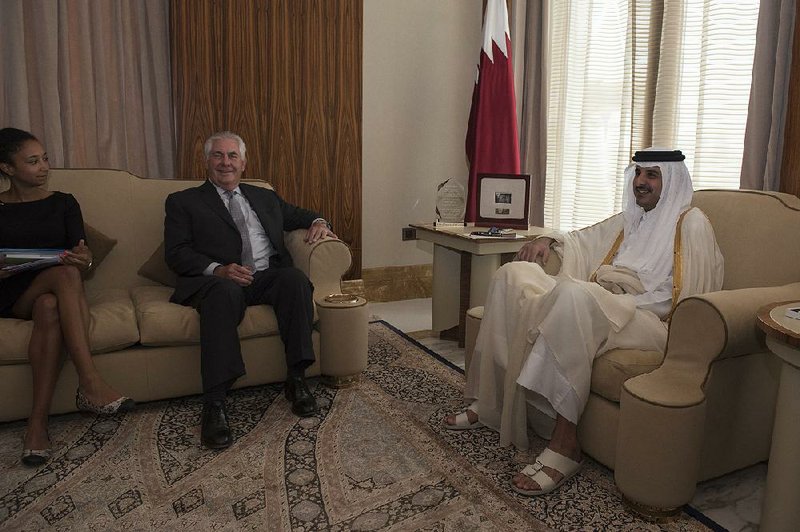DUBAI, United Arab Emirates -- The top U.S. diplomat wrapped up his first foray in shuttle diplomacy on Thursday with little sign of progress in breaking a deadlock between Qatar and four Arab neighbors that are isolating it.
U.S. Secretary of State Rex Tillerson traveled to the tiny, U.S.-allied Persian Gulf nation for a second time for a lunch meeting with Emir Tamim bin Hamad Al Thani, after talks earlier in the week in Kuwait and Saudi Arabia. As he flew back to Washington, Tillerson told reporters that the discussions had been "helpful" and that the U.S. planned to keep at it.
"In my view, there's a changed sense of willingness to at least be open to talking to one another, and that was not the case before I came," Tillerson said.
No meeting of the feuding nations has yet been announced. But Tillerson's aides had said ahead of time that they didn't expect a quick solution would result from his four days of talks.
Tillerson, a former Exxon Mobil chief executive officer with deep experience in the oil-rich Persian Gulf, has been shuttling between Qatar, Saudi Arabia and mediator Kuwait since Monday trying to repair a rift that is dividing some of America's most important Mideast allies.
Officials have downplayed expectations and said any resolution could be months away.
His clearest achievement has been to secure a memorandum of understanding with Qatar to strengthen its counterterrorism efforts and address shortfalls in policing terrorism funding.
That deal goes to the core of the anti-Qatar quartet's complaints against the natural gas-rich state: that it provides support for extremist groups.
Qatar vehemently denies the allegation, though it has provided aid that helps Islamist groups that others have branded as terrorists, such as the Muslim Brotherhood and the Palestinian militant group Hamas.
The anti-Qatar bloc argues that the pressure and demands it has placed on Qatar helped lead to the counterterrorism pact, but it says the agreement does not go far enough to end the dispute.
Those countries are holding fast to their insistence that Qatar bow to a 13-point list of demands that includes shutting down Qatar's flagship Al-Jazeera network and other news outlets, cutting ties with Islamist groups such as the Muslim Brotherhood, limiting Qatar's ties with Iran and expelling Turkish troops stationed in the country.
As he returned to Washington, Tillerson said he'd sought to catalog the Arab nations' concerns in written documents and sort them into "buckets" so they would be easier to address. He said some categories of concerns could be "addressed up front fairly quickly" but others were more complex and would take longer to resolve.
"If we can begin to have some success beginning to take some of these issues off the table, because we now have a way to move forward, then I'm hoping that will start the process of returning, normalizing relations," Tillerson said.
Qatar has rejected the demands, saying that agreeing to them wholesale would undermine its sovereignty.
It is intent on waiting out the crisis despite its neighbors' attempts to isolate it.
Shipping companies have set up other routes to get supplies in without going through the blockading countries, and flag carrier Qatar Airways continues to operate its 200-plane fleet by detouring over friendlier airspace.
The government says it is covering a tenfold increase in shipping costs for essentials. Ally Turkey and nearby Iran also have boosted exports to Qatar, and the country has even taken to importing cows to meet a dairy shortfall caused by the closure of its only land border with Saudi Arabia.
Qatar hosts al-Udeid Air Base, the largest U.S. military installation in the Middle East and hub for U.S.-led operations against the Islamic State extremist group in Iraq and Syria. Bahrain is home to the U.S. Navy's 5th Fleet, while American surveillance planes and other aircraft fly from the United Arab Emirates.
A Section on 07/14/2017

